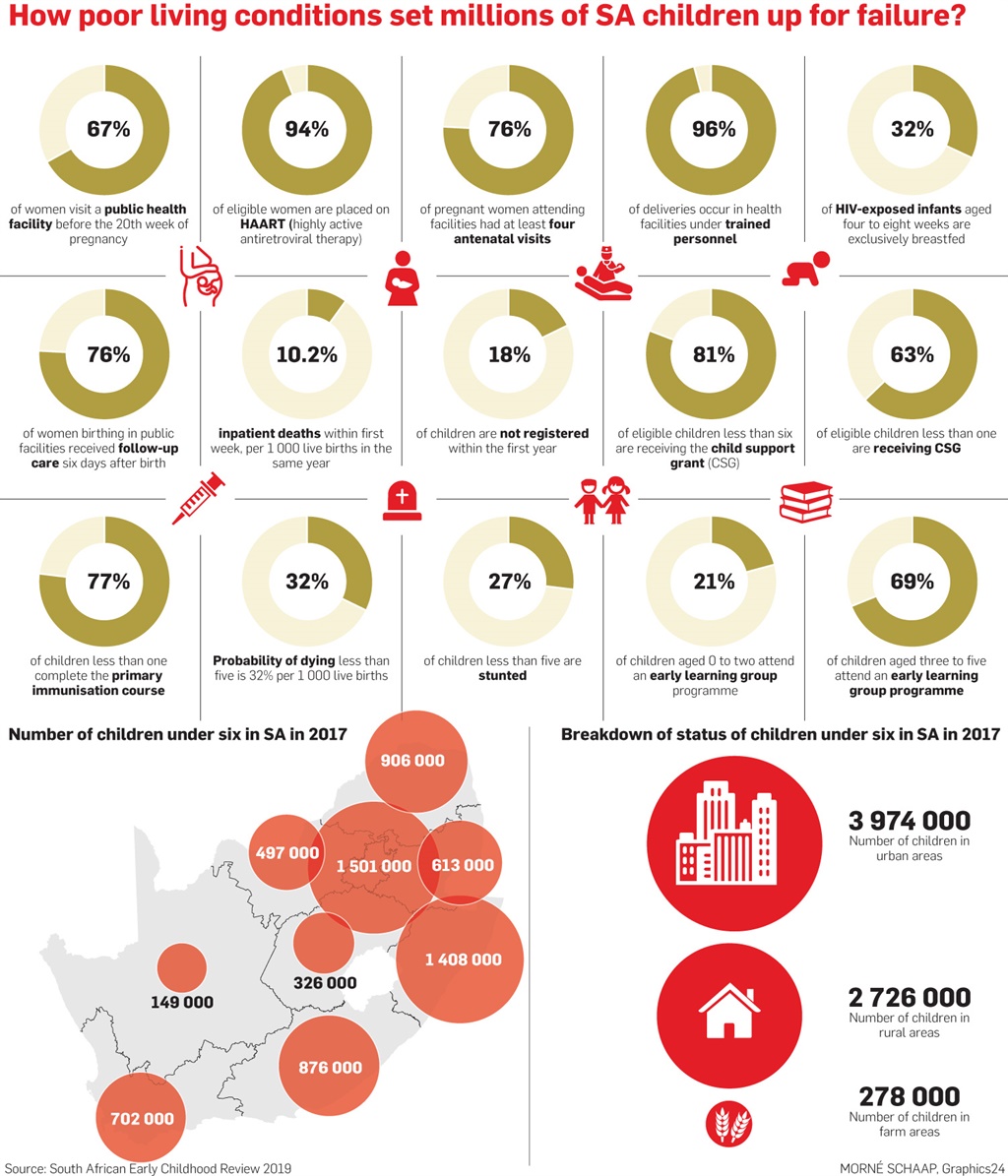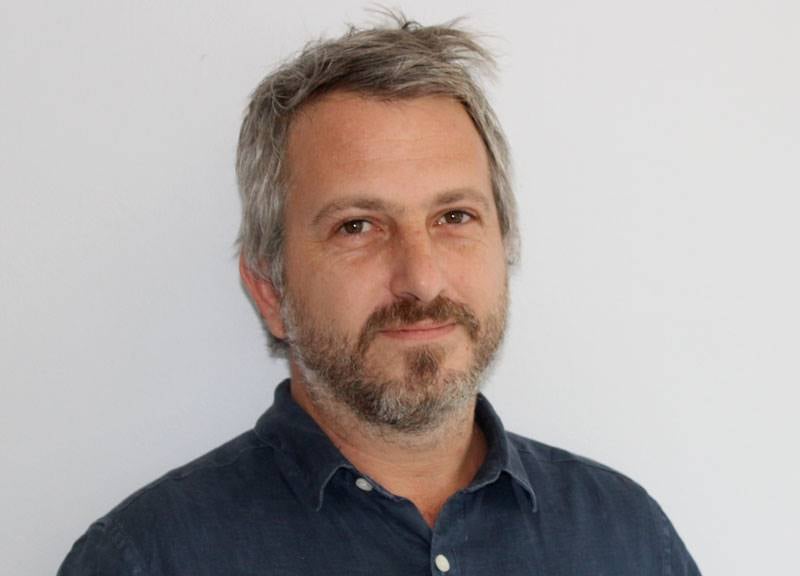Children living in poverty, mostly in the townships, informal settlements, rural and farm areas, are deprived of early childhood development, setting them up for failure
A damning new study has revealed how millions of children born in poor households in South Africa are likely to end up poor and jobless in the coming years – unless interventions were made now to improve the situation.
This year’s SA Early Childhood Review was released last month by Cape Town-based Ilifa Labantwana, an organisation fighting to secure an equal start for all children in the country.
It was co-authored by the Children’s Institute at the University of Cape Town, the department of planning, monitoring and evaluation in the presidency and Grow Great, and Innovation Edge.
The study measures the delivery of services to young children annually.
It found, among other things, that children living in poverty – mostly in the townships, informal settlements, rural and farm areas – are far less likely to attend an early childhood development (ECD) programme such as a preschool, than their wealthier peers and this carries lifelong consequences for them.
Experts proposed that the shift of the ECD programme from the department of social development to that of education, which is envisaged to improve the quality of education, was an opportunity to level the playing field.
Colin Almeleh, executive director of Ilifa Labantwana, said many of the problems the country faces, such as poor performance in primary and secondary school and high levels of unemployment, could be traced back to the inequalities in the delivery of services in the ECD phase.
“For example, a three-year-old from a well-off home is twice as likely to attend a quality ECD programme than a three-year-old from a poorer household. This unequal access to early learning opportunities, compounded by South Africa’s high rates of nutritional stunting, has set our poor children on a life course which is characterised by worse health, education performance, and job prospects, than their wealthier peers. When you consider that 65% of our children are living in poverty, you can understand how far-reaching the problem is,” Almeleh said.
The first five years of life, he said, were the most important period for brain development.
“It is literally a ‘once in a lifetime’ opportunity. Equal opportunity to access quality ECD services is the only sustainable long-term way for South Africa to redistribute and create wealth as a society.
“ECD is the backbone of shared prosperity, because it addresses structural inequality problems from the bottom up,” he said.
The study, he said, should not only be taken seriously by government but by everyone.
“All South Africans stand to benefit from a more prosperous and equal nation, when we ensure that every single child is given an equal start.”
Almeleh said the department of planning, monitoring and evaluation had supported and partnered with them on the publication of the study in line with government’s rating of ECD as a national priority.
In the foreword of the study, Kefiloe Masiteng, deputy secretary of the National Planning Commission (NPC), said many of the elements of the essential package of ECD were in place.
The essential package refers to services such as antenatal visits to health facilities, postnatal visits and immunisation, access to social grants, support for primary caregivers and stimulation of early learning.
The NPC has been tasked by government to develop strategies to resolve the country’s challenges and has produced the blueprint document – the National Development (NDP) 2030.
The study, Masiteng said, would provide the NPC with rich data on child development.
She said it showed that there had been some progress. However, there were also areas where there had been little or no progress.
“The picture painted by this year’s review is quite bleak. Despite the numerous interventions across different sectors, South Africa’s stunting rate at 27% remains unacceptably high,” Masiteng said in the study.
In 11 years, she said the country would reach 2030. The NDP sketches a hopeful future.
“This future can only be realised by working together to improve the lives of children in South Africa. Investing in our children’s future should be paramount in realising the objectives of the NDP,” she said.
Almeleh said the study drew links between various sets of data and made recommendations on how service delivery could be better designed to improve outcomes.
Other concerns the study details included poor capturing of the birth rates in the country, which resulted in exclusion of children.
“Here’s an example: 96% of babies are delivered in a health facility. This means that the baby’s parents are in direct physical contact with the health system at the very start of the baby’s life.
“At the same time, there are 200 000 babies born each year whose births are not registered, which results in exclusion from important services.
“The review makes a strong recommendation for better integration between the departments of health and home affairs to ensure that births can be registered at the health facility where they took place. This would go a long way to closing the gap in 200 000 unregistered births each year,” Almeleh said.
The study, he said, also acted as a barometer of progress.
“This is the third review we have published and the majority of the data indicators are the same. We can track whether there have been improvements in service delivery and child outcomes and hold those responsible accountable.
“Finally, another function of the review is to point out gaps in data when it comes to young children. For example, in this year’s review, we commented that data available on child abuse and neglect is very poor.
READ: Too many South Africans remain trapped in poverty. These are the consequences
“We hope that these recommendations are taken up by the responsible departments and improved. Access to reliable and open data is a very important tool for accountability,” Almeleh said.
According to Shamiso Chideme, social investment specialist at Tshikululu Social Investments, an organisation that works with partners to promote social investment, the first 1 000 days in a child’s life hold the key to unlocking their life-long potential.
By the age of five, almost 90% of a child’s brain will be developed.
“These are the formative years, where factors such as adequate healthcare; good nutrition; quality childcare and nurturing; a clean and safe environment; and early learning and stimulation will, to a large extent, determine a child’s future,” she said.
Currently, Chideme said, 5% of the national budget – R75 billion – goes towards early childhood development; the vast majority for primary healthcare for mothers and children. Only 6% goes to early learning, nutrition support, responsive parenting and early intervention.
“More interventions are needed to empower caregivers and communities to strengthen home care practices, including playing with and stimulating children by utilising household materials; recognising and tracking developmental milestones; nutritional and psychosocial support; and how to keep children safe and healthy.
“Caregivers must also be able to participate in social networks, be empowered to make decisions in the best interest of the child and be affirmed in the important role they play in the lives of the children in their care,” Chideme said




 Publications
Publications
 Partners
Partners











